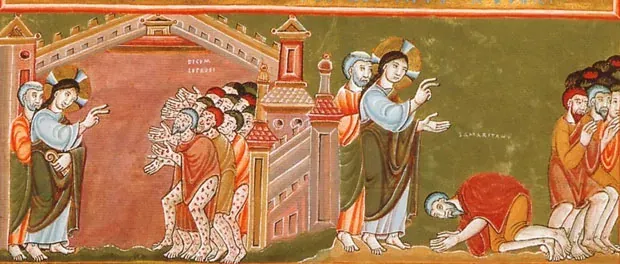Message of Abbot Paul - Sunday 9th October 2022
Abbot Paul • October 9, 2022

Two of the most fascinating characters of the Old Testament are the prophets Elijah and Elisha, whom we read about in the books of the Kings. Our first reading today comes from 2 Kings, (2 Kgs 5: 14-17), part of the longer story of Naaman the Syrian, who was afflicted with leprosy, a common disfiguring disease in those days. Taking the advice of one of his Jewish servant girls, he came to the prophet Elisha to seek healing. After a long wait, he was curtly told by Elisha to bathe seven times in the river Jordan. To begin with, he refused, thinking he deserved better treatment than that, but eventually he relented and bathed in the Jordan. Our reading takes up the story at that point. He wants to give Elisha an expensive present for his healing, but the prophet rejects the gift. Finally, Naaman asks if he can take home with him to Damascus two mule loads of soil from Jerusalem, so that he can always pray to the God of Israel on holy ground. Naaman, a Syrian pagan is not only healed of his leprosy, but converted to the one true God and saved. As the the Responsorial Psalm says, “The Lord has shown his salvation to the nations.”
In our Gospel passage from Luke, (Lk 17: 11-19), Jesus is travelling to Jerusalem along the border between Samaria and Galilee. “As he entered one of the villages, ten lepers came to meet him. They stood some way off and called to him, ‘Jesus! Master! Take pity on us.’ When he saw them, he said, ‘Go and show yourselves to the priests.’” These lepers would have been standing just outside the gates of the village, as they weren’t allowed in. They ask for mercy; in other words, healing rather than material help. They will have heard of Jesus’ ability to cure the sick. Jesus simply tells them to go and show themselves to the priests, meaning that they were cleansed and should be certified as clean. Indeed, we read, “Now as they were going away, they were cleansed.” They all had faith in the word of Jesus and were healed. However, only one returned to thank Jesus, recognising him to be more than an ordinary miracle healer, in fact, the Son of God, the Messiah. “Finding himself cured, one of them turned back praising God at the top of his voice and threw himself at the feet of Jesus and thanked him. The man was a Samaritan. This made Jesus say, ‘Were not all ten made clean? The other nine, where are they? It seems that no one has come back to give praise to God, except this foreigner.’ And he said to the man, ‘Stand up and go on your way. Your faith has saved you.’”
The man, who turns back praising God and throws himself at the feet of Jesus, thanking him, is a Samaritan, a heretic regarded as a foreigner and hated by the Jews. He alone praises God, recognises Jesus to be the Saviour and Redeemer and thanks him for what he has done. Why go to the priests when he can thank Jesus, the Eternal High Priest. Jesus recognises him to be a man of faith and declares, “Stand up and go on your way. Your faith has saved you.” Faith, made manifest in his praise of God and thanking Jesus, saves him as well as heals him, which is why he is free to stand and go on his way, walking always in the presence of God. May we follow his example.









